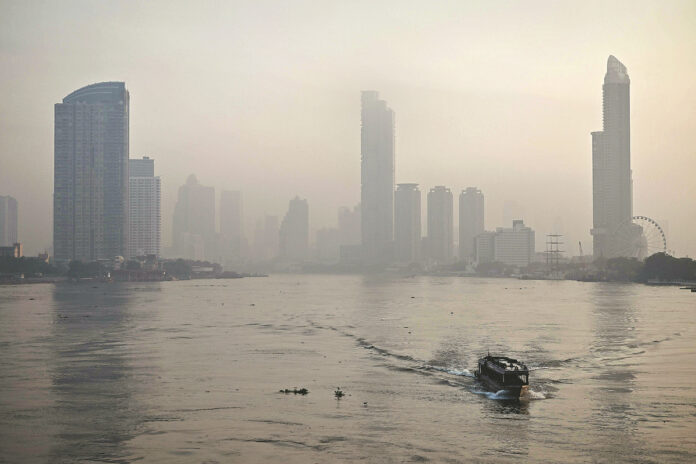In a concerning revelation, authorities have disclosed that more than 10 million Thais sought medical treatment for illnesses attributed to air pollution in the year 2023. This data, furnished by the National Economic and Social Development Council (NESDC), underscores the escalating severity of Thailand’s air quality crisis.
The nation’s air quality has been on a downward trajectory, exacerbated by widespread farm burning and forest fires, particularly prevalent in the northern regions, which frequently blanket the skies with a hazardous smog at the onset of each year. As 2024 unfolds, there has been a notable surge in pollution-related disease cases compared to the previous year.
According to AFP reports, the number of individuals seeking treatment for pollution-related illnesses has risen from 1.3 million in the first nine weeks of 2023 to 1.6 million at the outset of 2024, against the backdrop of Thailand’s approximate population of 72 million. These cases encompass a spectrum of chronic conditions such as lung cancer, bronchitis, asthma, and heart diseases.
The NESDC has emphasized the urgent need for Thailand to prioritize addressing the impact of PM 2.5 on public health. PM 2.5, referring to hazardous particles with diameters of 2.5 micrometers or smaller, poses severe health risks as it can infiltrate the bloodstream through the lungs. Exposure to these micro-pollutants can manifest in symptoms such as burning and itching in the eyes and skin, along with coughing and chest tightness, particularly exacerbated among individuals with pre-existing heart or lung conditions.
Some of Thailand’s northern cities, including Chiang Mai, Chiang Rai, and Lampang, have garnered “unhealthy” ratings from air quality monitoring platforms like IQAir, highlighting the gravity of the pollution crisis. This dire situation is exacerbated during the dry season, typically spanning from November to March, primarily attributed to seasonal burning practices by farmers clearing sugarcane and rice fields.
In response to mounting pressure, Prime Minister Srettha Thavisin pledged initiatives to ameliorate air quality, with legislative support for bills aimed at tackling the pollution problem. Recent measures include plans to deploy 30 aircraft nationwide for cloud seeding to induce rain and alleviate pollution.
Earlier this year, Bangkok urged employees to work from home for two days as pollution levels in the capital and surrounding provinces reached hazardous levels. Over the years, both residents and environmental groups in Thailand have resorted to legal recourse, filing lawsuits demanding government action against pollution. Notably, a Chiang Mai court mandated the government to formulate an emergency plan to enhance air quality within 90 days in response to a lawsuit filed by residents.
As Thailand grapples with the ramifications of its escalating pollution crisis, concerted efforts are imperative to safeguard public health and mitigate the adverse effects on the environment and populace alike.



